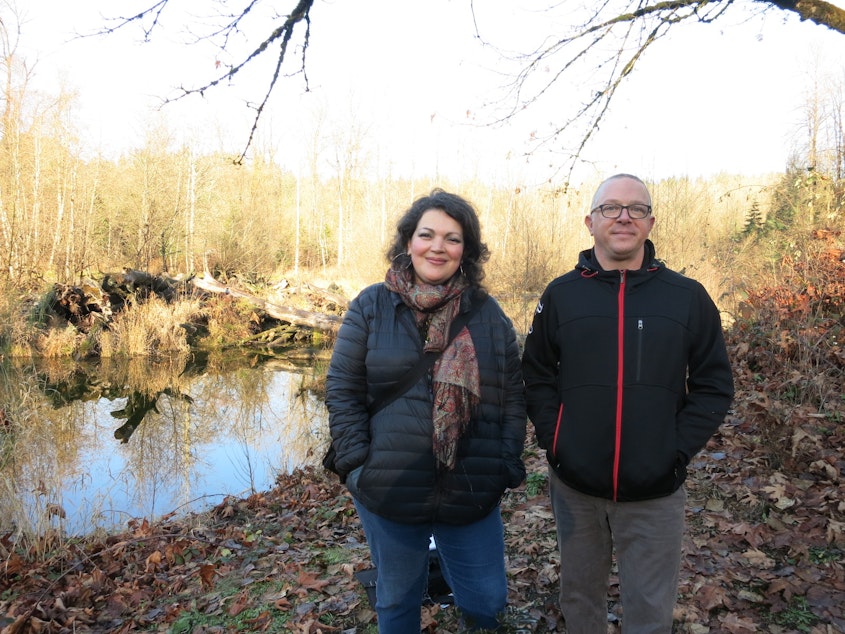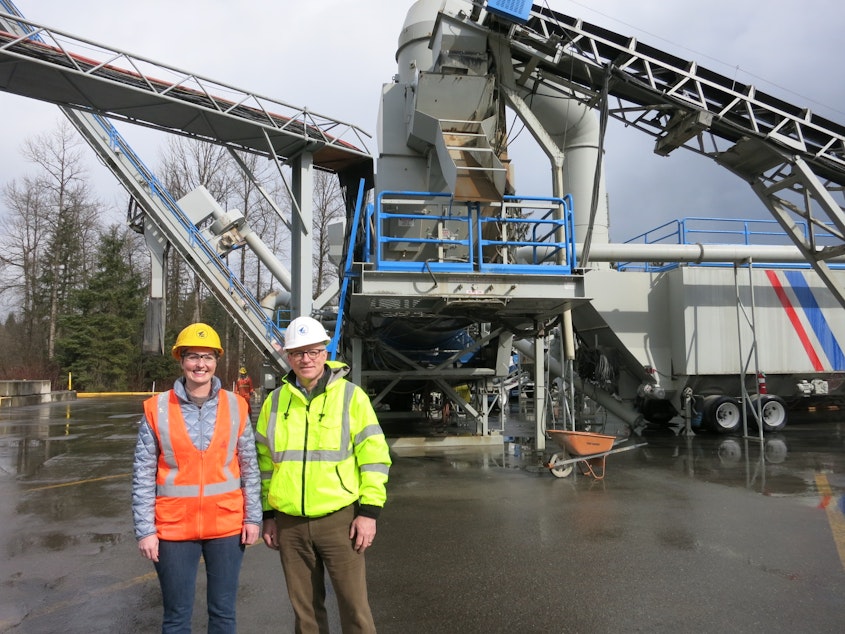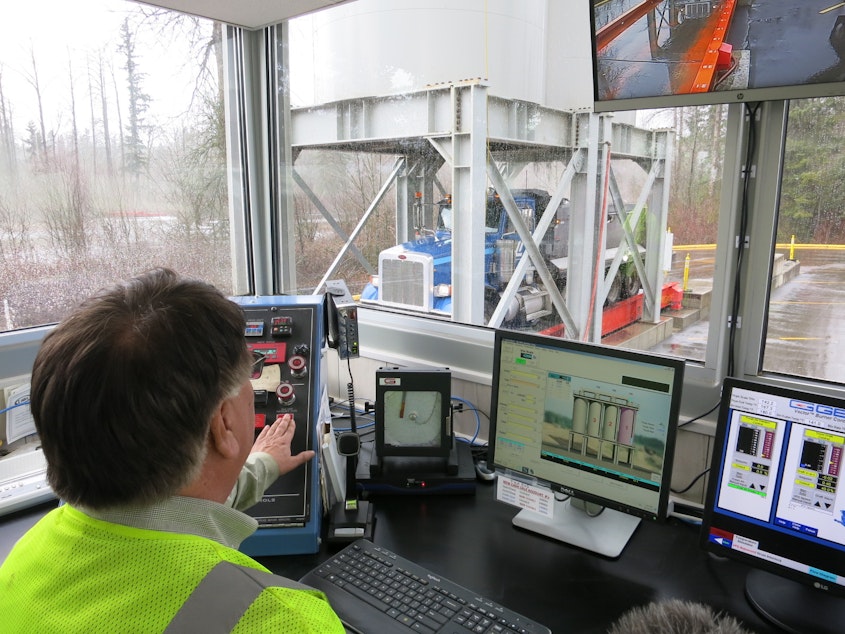You can’t make asphalt next to salmon habitat … Wait, can you?

Questions about a plan to build an asphalt plant across from where salmon lay their eggs, and baby salmon grow...
Lakeside Industries wants to build an asphalt plant on top of three streams and five wetlands in south King County, near Maple Valley.
It’s across the street from the Cedar River, vital habitat for Chinook salmon.
Meaghan Lodahl, a Maple Valley resident who opposes the plant, asked KUOW to look into this. She and others oppose the plant and noted that King County has invested $57 million over two decades to restore salmon habitat on the Cedar River.
“I'd like to understand why the King County Council seems to be working in opposition to their other work along the Cedar River,” said Hans Reifenrath, who wrote in with Meaghan Lodahl.
We checked it out.
Sponsored
Lakeside Industries told us this is an ideal location, and that it will do all it can to protect the environment.
“This property came up as really the best alternative to serve the market that we're in, serve the public and be close to a state highway on an industrial piece of land that is not really very close to residents,” said Mike Lee, president of Lakeside Industries.

The Maple Valley location would be ideal because the quick access to Interstate 405 and south King County is important because asphalt needs to stay warm en route to a construction site, Lee said.
The sites of the company's other asphalt plants, including one in Seattle's Fremont neighborhood, are polluted, according to the state Department of Ecology. At the current Covington plant location, environmental consultants found petroleum, diesel and oil in the soil and groundwater in 2016, and suspected the company’s asphalt operations and 20,000-gallon diesel storage tank caused it.
Sponsored
Lakeside confirmed that diesel leaked from lines connected to an underground diesel tank, and said they removed the faulty equipment and replaced it with updated, above ground technology.
“We have subsequently gone out and done a complete excavation of that contaminated material,” said Karen Deal, environmental director at Lakeside Industries.
The Covington plant got attention from air quality regulators recently, who issued violations over emissions testing and reporting requirements. The company is disputing those violations and provided records of their correspondence with the Puget Sound Clean Air Agency.
The land and water beneath other Lakeside properties in Bellevue, Kent, and the Fremont neighborhood of Seattle are contaminated with petroleum, diesel, or other pollutants, according to the state Department of Ecology’s list of confirmed and suspected sites of contamination.
“A lot of them are associated with historical operations that we weren't even involved with,” Deal said.
Sponsored
The 25-acre patch of ground in the outskirts of Maple Valley is also contaminated. It's a rare parcel surrounded by rural areas, where just one house every five acres is allowed.
In the 1920s, Pacific Crest Coal Company operated a mine here, and in the 1940s they sold it to King County, which used it as a maintenance and woodworking shop.
In 1997, the county removed 300 tons of soil to clean up the land, but they didn’t get it all.
In 2008, the King County Council formally zoned the land industrial, citing the need to protect industrial land from development, despite a staff report that said it was against county policy.
Sponsored
"Most industrial lands in King County are in heavily congested urban areas not well suited for large delivery trucks," council member Pete von Reichbauer testified back then. "Many of the existing industrial properties have been or are proposed to be converted to other retail and housing units."
In 2016, consultants for Lakeside noted the water and soil here are contaminated by chemicals, including petroleum, benzene and arsenic.
On a recent tour of the Covington asphalt plant, company officials pointed out measures they intend to take to prevent emissions, noise, and contain any potential spills, should the plant move to Maple Valley.
“Everything that's being put in place here is designed to ensure, absolutely ensure that we are not going to contribute to contamination of ground, groundwater, or surface water,” Deal said.
The company also points to stacks of reports from their consultants covering what the plant could impact, from noise and traffic, to water and wetlands.
Sponsored
“We can prove, and will prove, and are proving that we will not have any adverse effects,” Lee said.
Lakeside’s consultants have extensively researched the geological and environmental risks of the proposed site across from the Cedar River, and the company is not concerned the plant would have an impact, Lee said.
Moreover, plans include excavating the site's already contaminated soil and installing a system to treat storm-water runoff, which is more than the empty lot has now.
“The situation that we have, and that we are going to be creating, is a huge improvement for the quality of the water, for the salmon, for Puget Sound,” Lee said. “It's a huge improvement over what exists there today.”
The company plans to transfer operations from its current asphalt plant in Covington, about nine miles south, because their lease is ending and the property owners plan to turn the land into housing and a shopping center.
Meanwhile, neighbors from Maple Valley and the surrounding area picket the site, testify at public meetings, and organize over Facebook. Common concerns are traffic, emissions, and pollution that could harm the Cedar River’s threatened Chinook salmon.

Environmentalists say the project needs more independent scrutiny.
“You need a higher standard of care and transparency than what they’re currently engaging in,” said long-time environmental activist Greg Wingard, who is advising the Greater Maple Valley Unincorporated Area Council, which opposes the site.
Given the high stakes, environmentalists like Wingard and the Sierra Club are pushing for an extensive environmental impact analysis.
“If you have a spill on the road, it’s spitting distance to the river,” he said.
(Lakeside President Mike Lee responds that the asphalt would congeal if that happened: "You actually pick it up as a chunk," he said.)
The proposed location is separated from the Cedar River by the four-lane Renton Maple Valley Highway 169 and the Cedar River Trail on a raised berm.
Also lining up against the proposal are the local water district, which oversees the area’s drinking water, and the Cedar River Council, which oversees the river’s health.
“The salmon population continues to be critical, not only just to the salmon themselves, but to other things like the orca,” Cedar River Council chair, Max Prinsen said. “We have to look at these resources and make them as healthy as we can.”
The proposal hits a nerve—the community cherishes the river. Reifenrath comes here to photograph wildlife like eagles, bears and salmon, he said. Lodahl comes to unwind.
“The leaves are absolutely amazing down here in the fall,” she said. “It's just a really peaceful place to be.”
The county invested millions to help salmon, to restore the river’s natural flow, move a 50-unit mobile home park from a flood plain, and create protected side channels for baby salmon.
Baby salmon numbers are improving, but overall, the fish aren’t doing great, said Jason Mulvihill-Kuntz, salmon recovery manager for the Lake Washington/Cedar/Sammamish Watershed.
Mulvihill-Kuntz was not worried about the proposed asphalt facility, as current regulations would require the plant to limit its impact on water quality by treating any runoff on site.
“In terms of what might actually impact the salmon, I have not seen anything that causes me great concern,” he said.
While her department doesn’t take positions on proposals like this, head of the county's natural resources department, Christie True, is also putting her faith in the county’s environmental regulations and does not anticipate any impact.
“We have regulations that are really designed to ensure that we don't have impacts to water quality or to public health and safety,” she said.
But neighbors remain skeptical.
“I just don't believe it,” said Meaghan Lodahl, our question asker.




